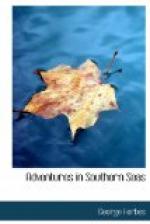From this it will be seen that the revenue of this prince is very considerable, and that he is personally interested in the death of foreigners within his kingdom, whether from natural causes or in the execution of the law, of which he is the sole arbiter.
CHAPTER XLVII
KING TRINKITAT
The space of an hour had barely elapsed since the sending of the messenger to King Trinkitat of Sumatra, announcing my arrival in his dominions, before an answer was brought me that his Majesty desired my attendance at the palace forthwith, so I made ready to accompany those he had sent for me, and who acted as my bodyguard.
The king’s palace stands in the middle of the town, its grounds being oval in shape, and about a half-mile in circumference, surrounded by a moat twenty-five feet broad, and as many deep. All round the palace there are cast up great heaps of earth instead of a wall, planted with reeds and canes that grow to a prodigious height and thickness. These reeds are continually green, so that there is no danger of fire. There is no ditch or drawbridge before the gates leading to the palace, but, on each side, a wall of stone, about ten feet high, that supports a terrace on which some guns are planted. A small stream runs through the middle of the palace, which is lined with stone, and has steps down to the bottom of it for the convenience of bathers. There were four gates and as many courts to be passed before we came to the royal apartments, and in some of these outer courts are kept the king’s magazines of rifles and cannon. Here also are stalls for the king’s elephants. In the king’s magazines are to be found numerous cannon, and a quantity of small arms, while his guards consist of a thousand men. But his greatest strength is in his elephants, which are trained to trample upon fire, and to stand unmoved at the report of artillery.
When we came to the inner courts, beyond which were the apartments of the king, our bodyguard halted, and Mahomet Achmet and I entered the king’s presence unattended.
We found his Majesty seated on a divan surrounded by his numerous wives and slaves, to the number of several hundred, for the apartment in which the king received us was a very large one, more resembling a courtyard than a room, since the roof was open to the sky. The king seemed to be a man of middle age, whom I judged to be about forty years old, but his attendants were all young, some of them scarcely more than children.
All were attired in the same manner, so that it was difficult to tell their sex, with short white breeches to above the knee, silken scarves of various colours wrapped round their waists, the end being thrown over the left shoulder, and white turbans upon their heads, into which their long hair was gathered. Some were yellow-skinned, others brown, others again jet-black. All had been rubbed with oil so that their skins glistened like polished marble, and they stood about the courtyard or around the king in silent groups, like so many statues.




